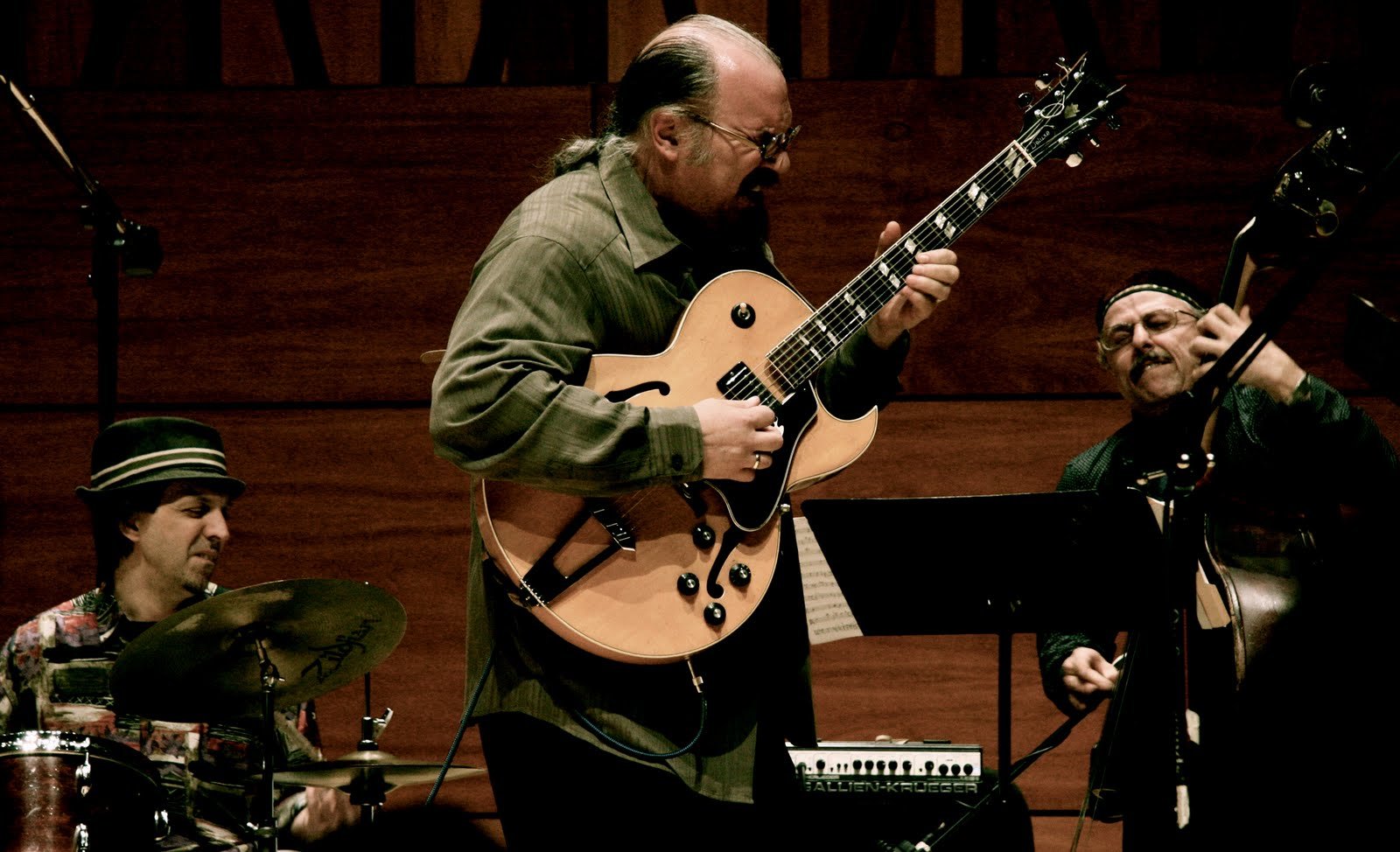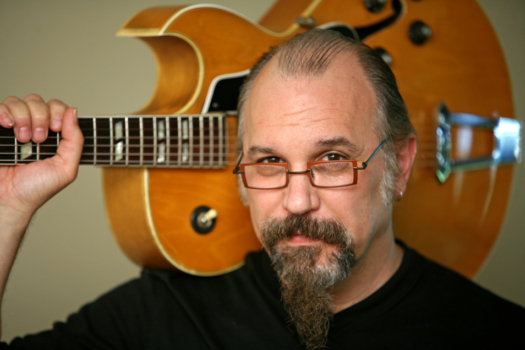Jazz interview with jazz guitarist Michael Musillami. An interview by email in writing.
JazzBluesNews.com: – First let’s start with where you grew up, and what got you interested in music?
Michael Musillami: – I was born in 1953 and raised in California. I studied with renowned guitarist Joe Diorio before moving permanently to the East coast in the early 1980’s, working primarily in organ trios led by Richard “Groove” Holmes and Bobby Buster among others. In addition to paying my dues as a sideman performing with musicians such as Junior Cook, Dewey Redman, and Curtis Fuller, I became a part of the circle of musicians connected to the Hillside Club in Waterbury, Connecticut, including frequent future collaborators Thomas Chapin and Mario Pavone.
JBN: – How did your sound evolve over time? What did you do to find and develop your sound?
MM: – It’s your voice, and for guitarists trying to find that voice … adding pedals and effects is not the answer in my opinion. I know it is easier to get over using effects and it does make it easier to connect notes, but to me it’s just fake and thin. The idea that running your instrument through a variety of effects all the time somehow gives you claim to “your personal sound” just doesn’t hold water. When I record, I play it straight, no effects, not even reverb. In the mixing process I’ll add a bit of reverb. There have been occasions where I did add an effect, but definitely not “my” sound, just what the piece required.
I can’t even listen to what I would consider highly evolved players masking their actual sound with fake and cliche sounds that everyone and their brother seems to display these days… most sound similar. The idea of jazz is that you develop your own individual sound, not something you buy at your local electronic store.
JBN: – What practice routine or exercise have you developed to maintain and improve your current musical ability especially pertaining to rhythm?
MM: – I began teaching at the Hotchkiss School in 1983. I am director of Jazz Studies as well as Director of the jazz ensemble called Right Brain Logic. Due to my teaching obligations, I’m always practicing with students. I don’t like practicing just to keep my chops up, but teaching requires that I inspire students, so the students keep me fluid and loose.
JBN: – How to prevent disparate influences from coloring what you’re doing?
MM: – Life can get in the way of life. Music, life, it’s all part of the same whole. I’ve written and performed some of my best work in desperate times. Emotion is what rules me. I know the music part of it. I don’t think scales, modes, rhythm … I live it through emotions. My music is emotion in music. I’m not concerned about wrong notes, or if folks like or dislike my message, I play and that’s all I’m responsible for.
JBN: – How do you prepare before your performances to help you maintain both spiritual and musical stamina?
MM: – If I’m touring with one of my groups I usually begin preparing about 6 weeks out. Preparations include technique exercises, memorizing all of the music as well as all musicians parts. I do pace myself so not to over practice and possibly get injured. Make sure all parts are written clearly and accurately. I try to get 3 or 4 group rehearsals in before the start of the tour.
Here could be an ad with a link about your album
2020 – New CD’s Advertisements – Buy from here • JazzBluesNews.com
JBN: – Ism is culled from a variety of lives dates with various performers over the course of a few years. Did your sound evolve during that time? And how did you select the musicians who play on the album?
MM: – I formed the Michael Musillami Trio in 2002. The idea of this trio was for it to be an improvising group, playing my original compositions written specifically for the MM Trio. I selected Joe Fonda and George Sculler for this trio. We are like minded in the sense that we can play standard tunes, though not in this group, we can play free, always in this group, and the cats are committed to making it work. On occasion we will add additional players to accommodate the written music.
For my two duo groups, one with the brilliant Peter Madsen and I’m excited about my duo with bassist Rich Syracuse. Both Peter and Rich are capable of going in any direction at any time.
JBN: – What’s the balance in music between intellect and soul?
MM: – For me, the intellect is baked into the soul. The science of music is a vehicle to get to the soul, the heartbeat of the music. I’m only concerned with the soul, the inventive, the spirit, the human part of playing creative music. I’m a storyteller in the world of creative music. My bandmates are also telling their story being conscience that we are creating a new story together … an awesome human event!
JBN: – There’s a two-way relationship between audience and artist; you’re okay with giving the people what they want?
MM: – I hope everyone that hears my music finds a connection to it, a way in. At age 67 I’m not overly concerned going into a performance that folks won’t like my music, though I’d be disappointed if the folks didn’t connect to it. I do what I do, the way I want to do it. I hope that listeners will give my musical message a shot and be open to it.
JBN: – Please any memories from gigs, jams, open acts and studio sessions which you’d like to share with us?
MM: – So many to pick from …
I’m in Linz Austria with MM Trio, Joe Fonda & George Schuller. We were playing in one of the many underground jazz taverns in Europe. We finished the set with George handing out hand bells to the audience, probably 50 people and 20 with bells. We finished our last piece with the folks playing bells with us … they became part of our band. It was so moving, I remember it from decades ago. As we left the venue we were walking down the street to go to an afterhours club for a jam session. Fonda had a wheel on the bass as we walked on the sidewalk and crossing streets. We were hit with flashing lights from the local police. They informed us that since the bass had a wheel he needed a license and a light on the bass and we would be receiving a traffic ticket. Some of the people from the venue, the bell players, our new band members, were walking with us. They explained to the police who we were and pleaded with them not to arrest the trio for a traffic violation of driving an illegal bass without license or light. What a night!!!
JBN: – How can we get young people interested in jazz when most of the standard tunes are half a century old?
MM: – I mentioned earlier that I am an instructor of guitar and I direct a 20 piece jazz ensemble called Right Brain Logic. I write original music for this group, rehearse them, and perform with them. Through private lessons as well as the jazz ensemble many of these young musicians have been affected by creative music.
In private lessons we work through the standard jazz repertoire, but also investigate a more open approach to expanding creativity. These youngsters are part of the jazz music scene. Perhaps they are listeners, and most likely they are players and listeners. It’s not easy to get a new ear to creative music, but it is very possible.
JBN: – John Coltrane said that music was his spirit. How do you understand the spirit and the meaning of life?
MM: – Music is emotion.
Once you go through all the science of music, scales, chords, rhythm etc. you are left with emotion. I play what I want to play and what I play is funneled through and led by emotion. The musical journey is the focus and a creative musician isn’t thinking, that’s the three chord of a specific key, you play from your soul … emotion.
JBN: – If you could change one thing in the musical world and it would become a reality, what would that be?
MM: – I would hope that the folks that write and talk about creative music could possibly move on to some new names and faces and new points of view in the music. I’ve been reading about the same 12 star musicians for the past 20 years. I’m bored. Not because there isn’t amazing talent out there … how about a new point of view??
JBN: – Who do you find yourself listening to these days?
MM: – Keith Jarrett, Peter Madsen, Bela Bartok, Tim Berne from the 80’s with Herb Robertson, … next month maybe some different people.
JBN: – What is the message you choose to bring through your music?
MM: – My music is emotional. You don’t have to understand technique, key changes, how loud or soft we play, or how fast or slow we play. I believe there is an opening in this music for anyone to connect to it … on an emotional level. If it’s true and honest, if it’s human and not cluttered with fake effects, listeners who give it a chance will find a way in if they want to.
JBN: – Let’s take a trip with a time machine, so where and why would you really wanna go?
MM: – Man, it’s difficult to go back or forward in time. I’m a realist and am content in dealing with the now … I’ve lived the past 67 years, so I know how that played out.
I’m interested in the now, and I’m trying to figure out how to be a creative musician that is responsible for a major independent label, Playscape Recordings. We have released close to 70+ albums. I need to figure out how to proceed in a pandemic, where the CD is close to being outdated as a vehicle for the delivery of music and how musicians can earn funds to live and continue to be a jazz musician. This is the music question of our time. How DO we proceed?
Interview by Simon Sargsyan







More Stories
Interview with Janis Siegel of The Manhattan Transfer: Jazz, being a more refined, interpreted form of music
CD review: George Benson – Dreams Do Come True: When George Benson Meets Robert Farnon – 2024: Video, CD cover
The band was tight as ever. The Warren Haynes Band cuts loose: Video, Photos